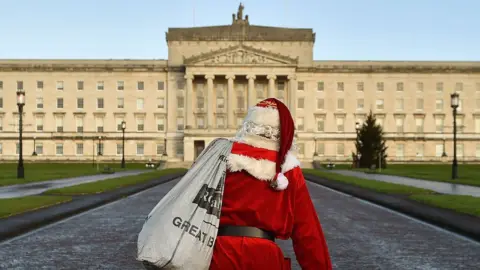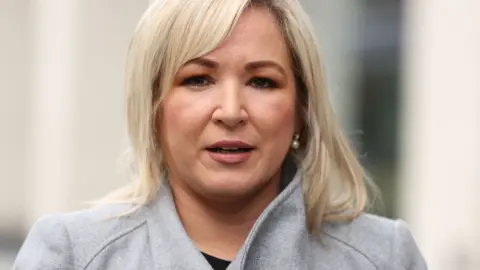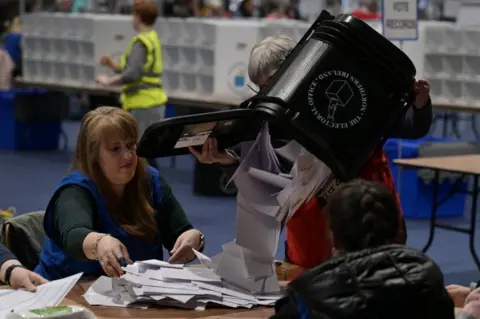No Christmas election for Northern Ireland Assembly
 Getty Images
Getty ImagesThere will not be a Stormont assembly election before Christmas, the Northern Ireland secretary has confirmed.
Chris Heaton-Harris had said he would call another poll after the deadline to restore power-sharing passed last week.
The law requires an election within 12 weeks of that 28 October deadline but it will not happen next month.
Devolved government has not functioned since February, with the Democratic Unionist Party (DUP) blocking the formation of the ruling executive.
The party has taken that stance in its protest against the post-Brexit trading arrangement known as the Northern Ireland Protocol.
What has Chris Heaton-Harris said?
It had been expected that a poll could be held on 15 December and electoral staff had been preparing for that date.
But on Friday, Mr Heaton-Harris said that, having heard people's concerns about the impact and cost of a snap election, it would not take place "ahead of the festive season".
He said he would lay out his next steps in Parliament next week, and that his aim was in line with what the people of Northern Ireland deserved - the restoration of a devolved government.
"My duty is to create the right environment for the parties in Northern Ireland to work together to restore the devolved institutions and deliver on crucial issues impacting Northern Ireland's people," said Mr Heaton-Harris.
"I do not take this duty lightly, nor do I overlook the very real concerns people have around their cost of living."
His comments came two days after Northern Ireland Office Minister Steve Baker said a date for another Stormont election would be confirmed soon.


You can almost feel the collective sigh of relief.
The Northern Ireland secretary's decision to scrap his December election plan is an early Christmas present for the political parties.
They dreaded the prospect of going to the polls 10 days before Christmas in an election that was only ever going to deepen the political crisis.
But the U-turn by Chris Heaton-Harris has damaged his credibility and raised questions about how the issue was managed by the Northern Ireland Office.

So when might an election happen?
Northern Ireland's chief electoral officer Virginia McVea said she had been given no direction to plan for a post-Christmas election in January.
Her staff had been contingency planning for an election on 15 December but that has been stood down, she said.
The latest that an election could take place within the 12-week period set by Westminster is 19 January but that would require a campaign over Christmas.
Instead Mr Heaton-Harris may have to delay the new deadline by passing legislation at Westminster.
Why is Stormont in crisis again?
The most recent assembly election in May resulted in Sinn Féin winning the most seats for the first time.
That meant Michelle O'Neill from Sinn Féin was entitled to the role of first minister.
 PA Media
PA MediaThe DUP was the second-biggest party but it refused to nominate a deputy first minister, meaning a governing executive for Northern Ireland could not be formed.
The DUP has refused to return to power-sharing at Stormont until the Northern Ireland Protocol is scrapped or changed.
The protocol keeps Northern Ireland aligned with some EU trade rules to ensure that goods can move freely across the Irish land border after Brexit.
Unionist parties argue that it has undermined Northern Ireland's place within the UK by effectively creating a trade border with England, Scotland and Wales.
The UK wants a fundamental rewrite of the treaty while the EU believes sufficient "flexibilities" can be found within the existing text.
On Friday EU sources told BBC News that talks with the UK about the protocol were making "slow progress".

Read more: Stormont crisis explained

How have the politicians reacted?
Michelle O'Neill, the Sinn Féin vice-president, accused the Northern Ireland secretary of "dithering and indecision" over not calling an election.
His announcement was a "continuation of the Tory chaos in London that is now paralysing our politics", she added.
"The British government and the DUP are leaving us in a prolonged state of political limbo with no assembly, executive or caretaker ministers," she said.
DUP leader Sir Jeffrey Donaldson tweeted that there should be a "razor sharp focus on getting a solution" to his party's concerns about the Northern Ireland Protocol.
Allow X content?
Alliance Party leader Naomi Long said she was glad the Northern Ireland secretary had "listened regarding the folly" in holding an election.
But she said he also had to "recognise real reform of the institutions is urgently needed" and that it was "time to end ransom politics".
Doug Beattie, the Ulster Unionist leader, said it had taken a "degree of courage" for Mr Heaton-Harris to rule out an election in December.
He said "we need to see some outcomes" of the negotiations between the UK and the EU over the Northern Ireland Protocol before Christmas.
 Getty Images
Getty ImagesSDLP leader Colum Eastwood said that with an election "kicked into touch" Mr Heaton-Harris should focus on restoring Stormont and getting much-needed cost-of-living support to families before winter bites.
Taoiseach (Irish Prime Minister) Micheál Martin welcomed the decision not to call a poll, and called for time and space to be given to help resolve the deadlock.
"Patience is a virtue in respect of Northern Ireland," he said.
"In the modern era we tend to want clarification every day but sometimes you have to give time.
"There's a new government in London and they have to be given space to deal with this."
Mr Martin added that his priority remained the negotiations on the protocol between the UK and EU, but said he did not underestimate the challenges involved.
A British-Irish Council summit is expected to take place next week that will involve ministers from London and Dublin.
What were the concerns about a December election?
The prospect of a Christmas election was unpopular with both politicians and the public.
The cost had been one common complaint after the Electoral Office of Northern Ireland said it would need about £6.5m to run the poll.
Policing May's election cost more than £670,000, and PSNI Chief Constable Simon Byrne said a similar total would have to be spent if another election was held before Christmas.
There were also concerns about a low turn-out of voters due to the colder weather, as well as extra pressure that would have been put on venues such as schools used as polling stations, with the possibility of cancelling Christmas plays.
